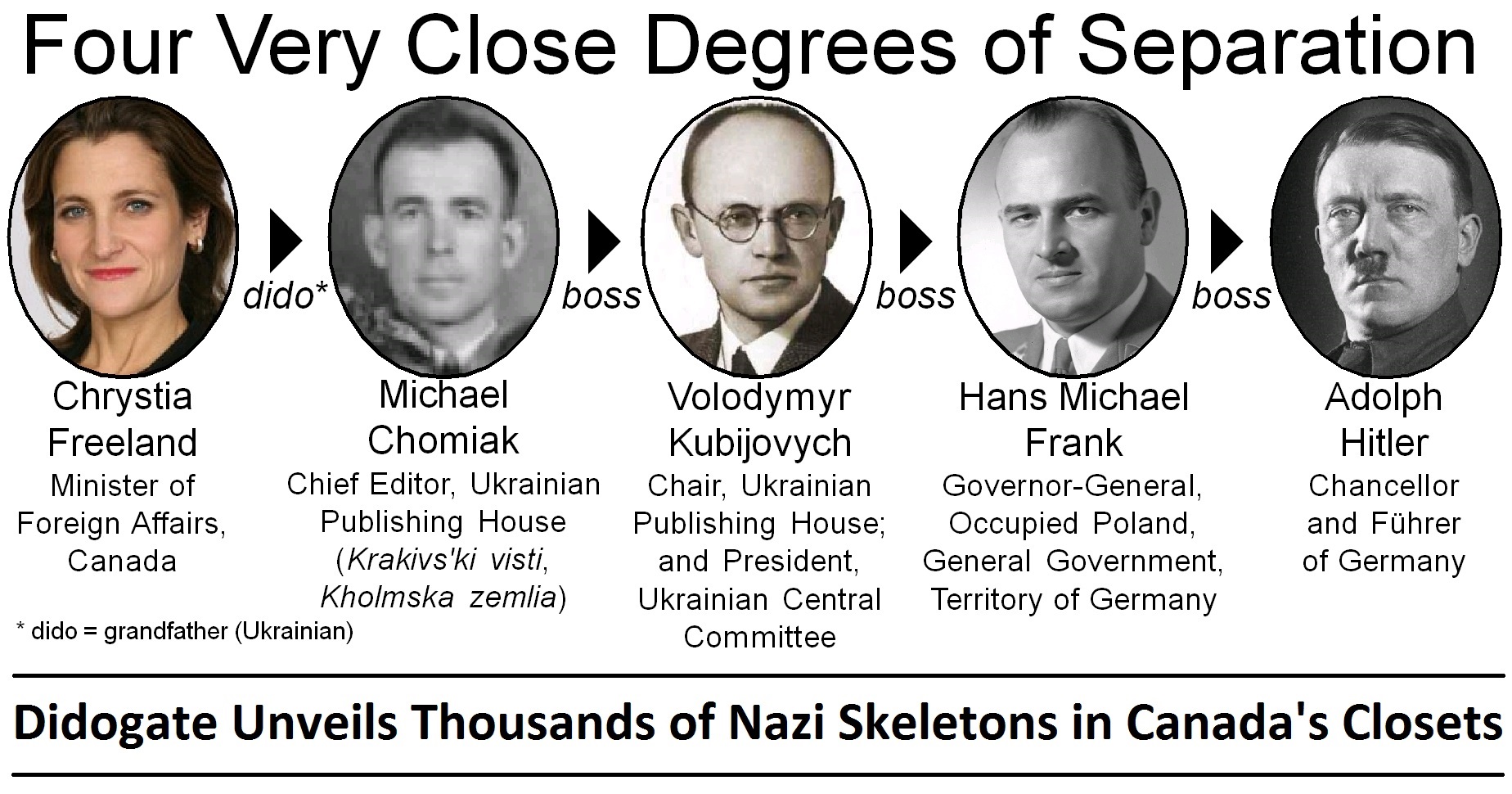
Minister Freeland's Grandfather,
Fake News,
|
|
|
By Richard Sanders, editor, Press for Conversion! magazine of the Coalition to Oppose the Arms Trade, March 22, 2017 "It takes a village to raise a Nazi" (old African proverb, slightly modified) |
|
|
1- Introduction 2 - The Liberal Government's Warm Embrace of Ukraine's Nazi Collaborators 3 - Historical Amnesia and the Blinding Effects of Propaganda 4 - The Nazis as Victims? Sure, just Blame the Russians! 5 - Canada needs Truth and Reconciliation, not Denials and Obfuscation 6 - Historical Denial among Canada's ultranationalist Ukrainians 7 - Michael Chomiak, The Ukrainian Central Committee and its Nazi Newspapers 8 - Aryanisation and the "Mighty Wurlitzer" 9 - The Ukrainian Canadian Congress and its Fascist Roots 10 - Getting them Early: Building the ultraNationalist Cause among Children and Youth 11 - The Freeland-Chomiak Parallels in Advocacy Journalism 12 - Was Freeland an "Accidental Journalist," or Groomed for the Job? 13 - In 1989, Freeland was Declared an "Enemy of the Soviet State" 14 - A Chomiak-Freeland Fixation on Jewish Oligarchs running the Kremlin 15 - Freeland's Kremlin-Oligarch Theory goes Global with Jewish Plutarchetype 16 - Institutionalised Confidence Scams: An Open Conspiracy of Oligarchs, Politicians and Journalists 17 - Escaping the War Racket starts with Seeing the Elephant 18 - Just Following Orders? Which Orders? 19 - Is there a Bear in the Room? Kill it! 20 - The Collective Care and Feeding of Russophobia 21 - The Need for Truth and Reconciliation
If you appreciate the work that went into this research, please
subscribe &/or donate.
You can mail this
coupon
to COAT, or use the
Paypal link
on our homepage. Subscription prices:
Captive
Canada: This issue (#68) deals with the mass internment of Ukrainian Canadians, this community's left-right split and the mainstream racist, xenophobic anti-communism of progressive "Social Gospellers" (like the CCF's J.S. Woodsworth) who were so captivated by their false beliefs that they carried out the genocide of First Nations and turned a blind eye to government repression during the 20th-century "Red Scare." The main thesis is captured here: |
Part 4 Chrystia Freeland has always been careful to portray her Nazi propagandist grandfather and his family as victims of the Soviets during WWII. In all of her narratives of their wartime experiences she creates the impression that they were innocent people who were forced in 1939 to flee from their beloved Ukrainian homeland by the Soviet communists and their invading Red Army. Freeland's simplistic morality tales about her grandfather's life during the war never actually mentioned anything about his complicity with the Third Reich. In fact, she never divulged a single thing about what he was actually doing during the entire length of the war. Instead, Freeland has always used her narratives as an excuse to criticise the Soviet Union and suggest that they were the real aggressors of WWII.[i]
A typical Russophobic response to crisis was clearly evidenced in Freeland's recent efforts to divert public attention from the truth that her maternal grandfather was indeed a Nazi collaborator. On March 6, Freeland was asked to respond to what the Globe and Mail called "allegations" that her grandfather was a Nazi collaborator. Here is what she said: "I don't think it's a secret. American officials have publicly said, and even [German Chancellor] Angela Merkel has publicly said, that there were efforts on the Russian side to destabilize Western democracies, and I think it shouldn't come as a surprise if these same efforts were used against Canada.... I think that Canadians and indeed other western countries should be prepared for similar efforts to be directed at them."[ii]
"Foreign Affairs Minister Chrystia Freeland, who is being targeted by allegations in pro-Moscow websites that her maternal Ukrainian grandfather was a Nazi collaborator, warned Monday that Canada should expect to be the focus of Russian disinformation campaigns..." [iii] (Emphasis added.) Outright denial was initially used as another official line of defence. The Globe and Mail, for which Freeland worked as deputy editor (1999-2001),[iv] reported that "An official in Ms. Freeland's office denied that the minister’s grandfather was a Nazi collaborator."[v]
This is not untypical. The best defence, after all, is supposed to be a good offence. And, when in doubt, it is now a century-old western tradition to throw blame at the Russians. But what if this truth about Freeland's Nazi heritage had been revealed by "proJewish" websites? Would Freeland, Grod and the Globe and Mail have had the chutzpah to say that she was "being targeted" by Jews? (Chutzpah, said Leo Rosten, is "that quality enshrined in a man who, having killed his mother and father, throws himself on the mercy of the court because he is an orphan."[vii])
"Conservative foreign affairs critic Peter Kent who said it was obvious the Russians dug up details on Mr. Chomiak’s past to smear Ms. Freeland. 'It is unacceptable. It seems they are trying smear a minister with historical detail that has probably been misrepresented,' he said. “It is unfair and it is typical of what we have seen in other countries and it has nothing to do with her ability to represent Canada.” [viii] As a former journalist, does Mr. Kent not realise that the truth is actually something worthy of some respect? And, surely a person's inability to report or tell the truth does actually affect their "ability to represent Canada." Whether someone is representing Canada as a news reporter or as a politician ‑ dual careers that Kent and Freeland share ‑ surely standing for the truth must mean something. But perhaps in the world of journalism and politics, serving the truth is, at best, not a prime concern.
|
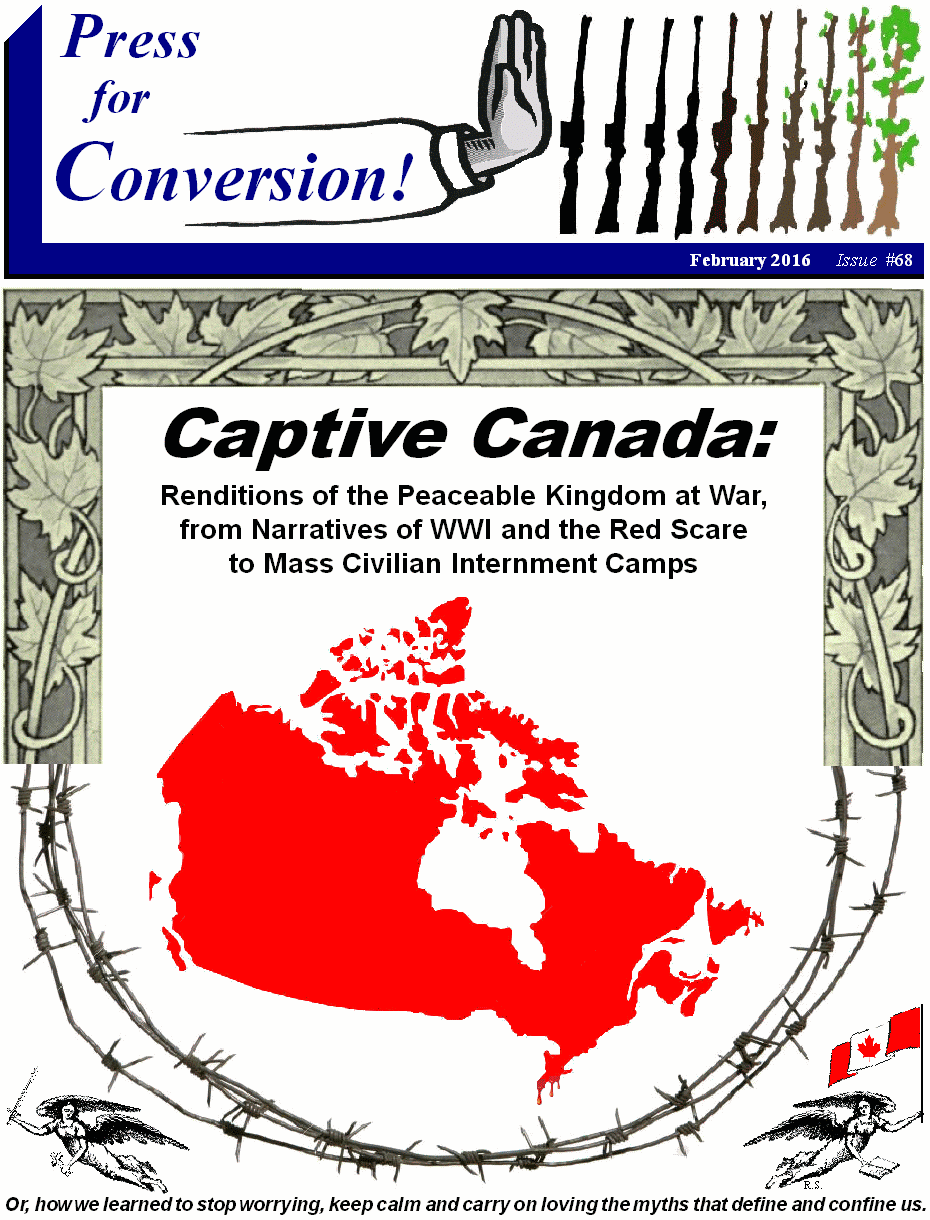
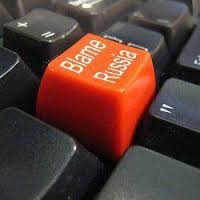 One of the memes basic to many of
Freeland's narratives, one which she often falls back on ‑ regardless of the
subject at hand ‑ is that Russian leaders are to blame. In her world, the
official all-enduring backstory is that, whether communist or capitalist,
Moscow's Kremlin can never be trusted. This, of course, is not a fringe
belief. For a century, the world of mainstream western institutions ‑
whether political, economic or military ‑ have all used narratives that use
the bogeyman of Russian leaders to arouse moral panics on the homefront.
The main machinery used to spread these social phobias has been the mass
corporate media.
One of the memes basic to many of
Freeland's narratives, one which she often falls back on ‑ regardless of the
subject at hand ‑ is that Russian leaders are to blame. In her world, the
official all-enduring backstory is that, whether communist or capitalist,
Moscow's Kremlin can never be trusted. This, of course, is not a fringe
belief. For a century, the world of mainstream western institutions ‑
whether political, economic or military ‑ have all used narratives that use
the bogeyman of Russian leaders to arouse moral panics on the homefront.
The main machinery used to spread these social phobias has been the mass
corporate media.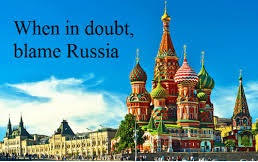 The Globe and Mail followed
lock-step in this mainstream line of defence. It's article, entitled
"Freeland warns Canadians to beware of Russian disinformation," confirms her
accusations in its very first line:
The Globe and Mail followed
lock-step in this mainstream line of defence. It's article, entitled
"Freeland warns Canadians to beware of Russian disinformation," confirms her
accusations in its very first line: 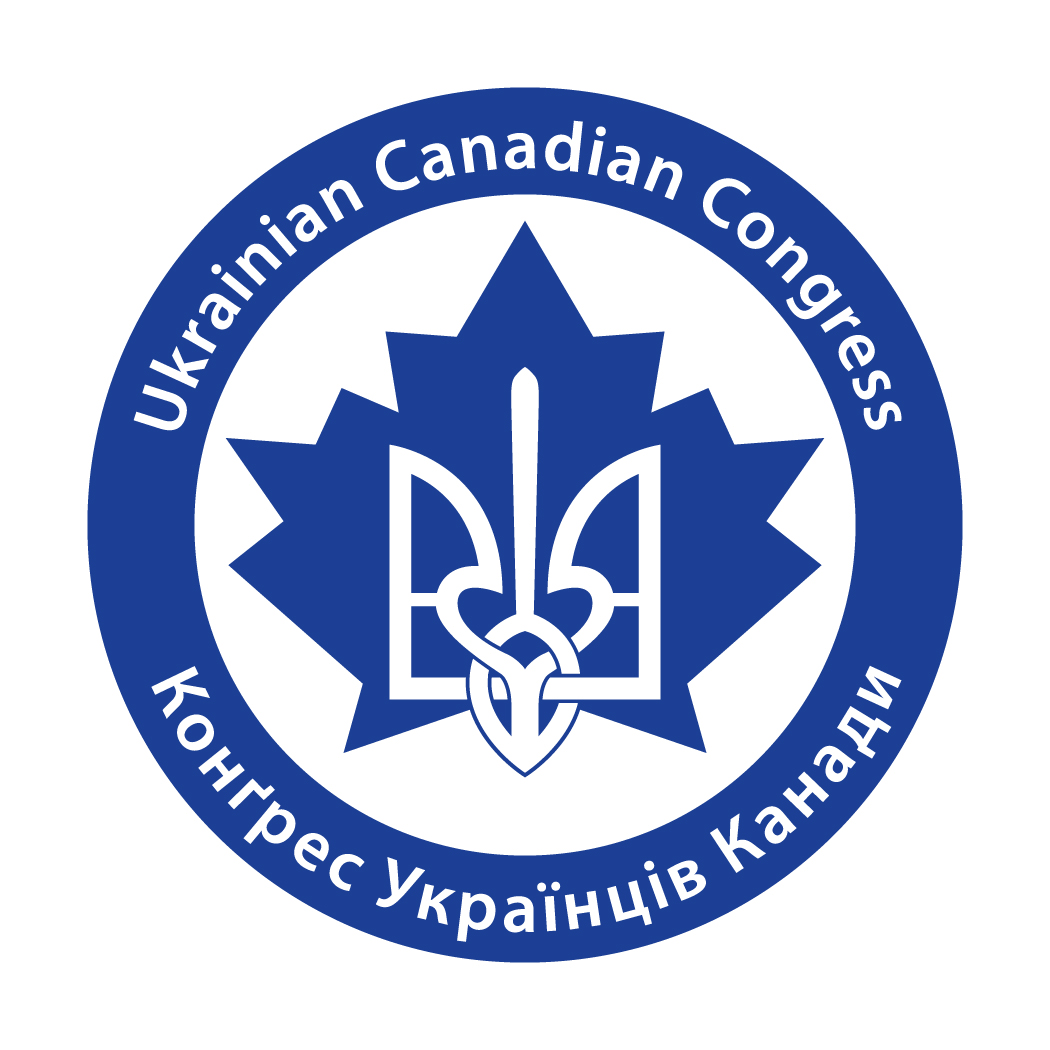 In an effort to rally the faithful, the
newspaper called upon the words of Paul Grod, president of the
In an effort to rally the faithful, the
newspaper called upon the words of Paul Grod, president of the
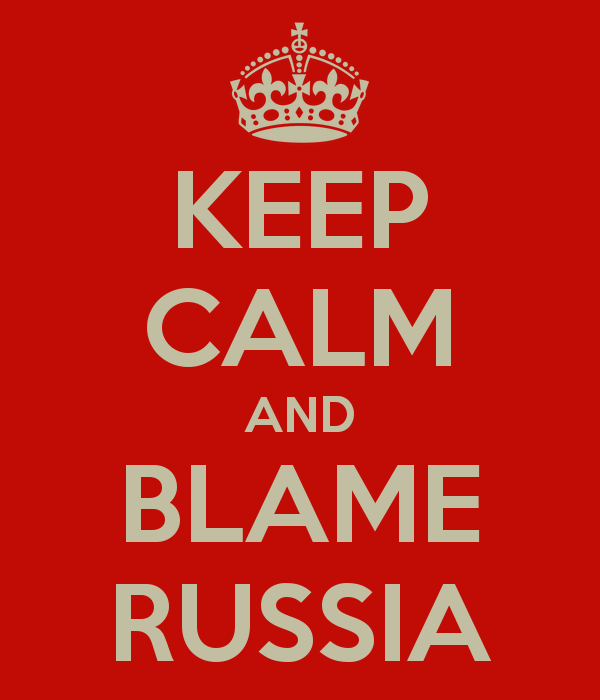 Even when the Globe and Mail
acknowledged on March 7 that Freeland actually knew that her grandfather had
edited a Nazi newspaper, it still continued to blame the Russians. The
article's second sentence returned to the fall-back position of blaming the
Russians. It read: "Ms. Freeland's family history has become a target for
Russian forces seeking to discredit one of Canada’s highly placed defenders
of Ukraine." Russian forces? And, the paper also included this gem:
Even when the Globe and Mail
acknowledged on March 7 that Freeland actually knew that her grandfather had
edited a Nazi newspaper, it still continued to blame the Russians. The
article's second sentence returned to the fall-back position of blaming the
Russians. It read: "Ms. Freeland's family history has become a target for
Russian forces seeking to discredit one of Canada’s highly placed defenders
of Ukraine." Russian forces? And, the paper also included this gem: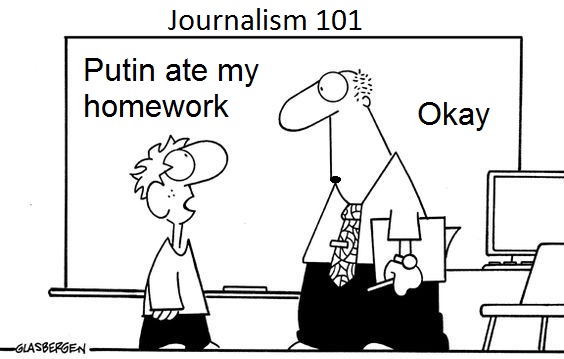 Many representatives of
Many representatives of